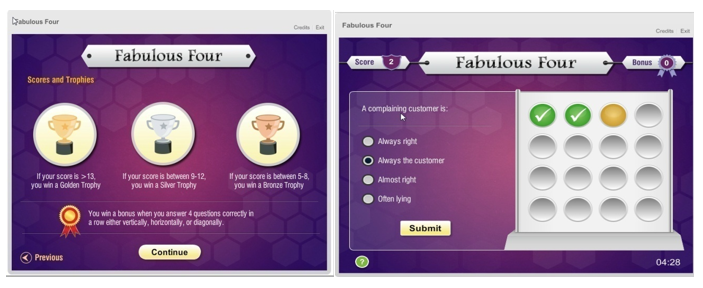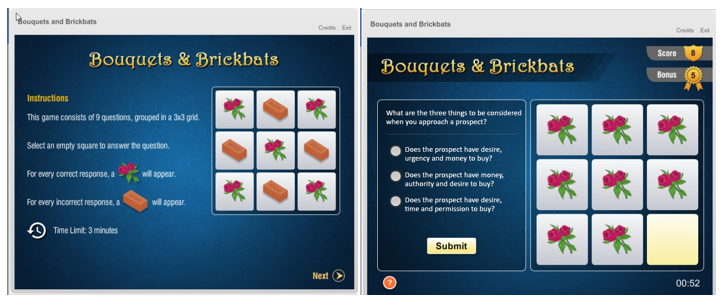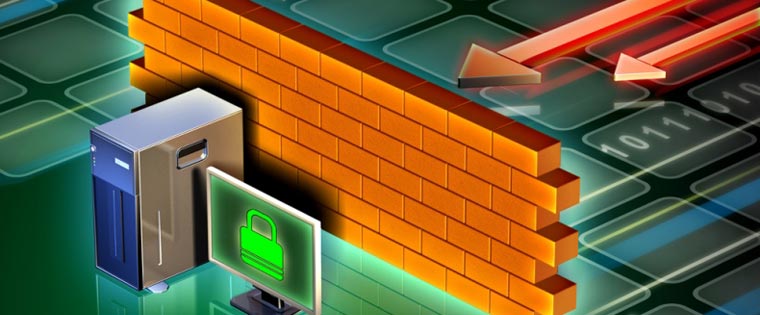Using Interactive Learning Games To Engage Your Sales Force

When your sales reps sell, what do they sell? Do they sell a product or a solution? Solutions to their problems are always more appealing to prospects than just information about product features. How those features solve customer problems is what matters most. Therefore, your reps should be thorough with product features but they also need to know how to align those features with customers’ requirements. Clearly, product knowledge training is one of the most important trainings your sales reps receive. It is widely quoted that retail sales associates with strong brand expertise sell 87 percent more than peers without brand expertise. In addition to product knowledge, reps should also be trained on the psychology of selling and the company’s sales processes and procedures. Traditionally, this was done through classroom training sessions, but in today’s fast paced business world, it is usually hard to take time off for attending a training program.
Sharing a bunch of training manuals or PPTs with your sales force also would not be effective. Training has to be interactive and engaging. The next best option to classroom training would be e-learning. You can make it engaging and interactive by including some game elements to emphasize the knowledge sales people require. Here are some ideas on where you can use game elements in product knowledge training for sales people.
Help identify product features and customer personas
For your sales rep to sell a product, it is not just your product he needs to know about but also the competitor’s product. So, product knowledge training also involves imparting knowledge about competitor’s products. Interactive learning games can help trigger your reps’ interest levels as they motivate them intrinsically and extrinsically too.
You can use learning games to reinforce the training given in the classroom and also to assess them on their product knowledge. You can ask them questions such as “Which product feature of theirs is missing in the competitor’s product so that it can act as an USP. For example, we designed a game,
“Fabulous Four”, that consists of 16 questions and the learners receive gold, silver, and bronze
trophies based on their scores. They even get a bonus if they answer 4 questions correctly in a row. You can frame questions that allow them to know how many customers opted for your product and why. You can also check their knowledge on the clientele, both old and new, by giving them a set of questions so that they can impress their prospective customers with their domain knowledge i.e., products, customers, and competitors’ products.

Support the development of Sales concepts
Your sales reps cannot be considered thoroughly trained unless they are trained on all the sales concepts such as negotiation skills, presentation skills, handling objections, product demo techniques, cross-selling, up-selling, etc. In gamified assessments, you can give various scenario-based questions and ask reps to choose the right course of action to be taken, if they were to handle those situations at real work. Based on the scenario, they need to judge which option they choose to go with. For example, you can pose a scenario-based question and ask them to identify whether that is an example of cross-selling or up selling. Such interactive learning game assessments engage your reps and help them learn better. When product knowledge is accompanied by company knowledge, only then will sales reps know what to up sell and cross-sell. For example, your sales rep meets a customer who requires a laptop and after a dialogue with him, realizes that he is looking for a high-end laptop and not the basic one he sells. If he has thorough product knowledge, he can immediately refer his peer who deals with the high-end version that provides solution the customer needs. We have designed gamified assessments such as “You Can Do It” and “Boutiques and Brickbats” that can be used for testing your reps’ skills. A learner has to go through a set of 9 questions and for every correct answer, a bouquet appears onscreen and for every incorrect one, a brick.

Product knowledge training, being an essential part of selling, goes a long way in adding value to your sales reps’ sales. To help training stick, you can use interactive learning game assessments that help assess your reps’ knowledge acquired in traditional classroom training sessions.
Hope you like the post. Want to gamify your product knowledge training programs? Get in touch with us now.



![Make Your Rarely-Visited LMS the Hot Favorite – Bet on Gamification! [Infographic]](https://blog.commlabindia.com/hubfs/Imported_Blog_Media/lms-gamification-infographic1.jpg)

![Interactive Videos—A Game-Changer in eLearning Engagement [Infographic]](https://blog.commlabindia.com/hubfs/blogs/interactive-elearning-videos-strategies-info.jpg)